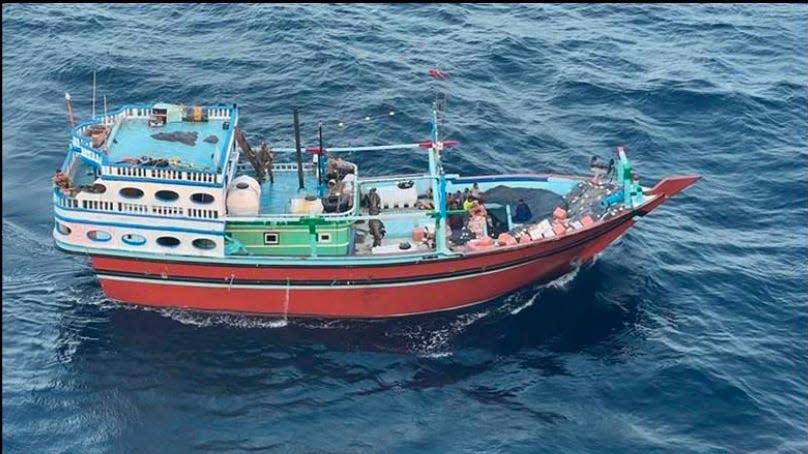Suspected Iranian spy ship sails for home, leaving troubled waters as Tehran braces for Israeli retaliation
An Iranian ship suspected of providing intelligence to the Houthis is sailing home.
The MV Behshad spent several months near Yemen as the Houthis launched attacks.
Shipping data shows its back near Iran as Tehran braces for a potential Israeli retaliation.
An Iranian cargo ship that is suspected of having provided targeting information and intelligence to the Houthis for their Red Sea attacks appears to have sailed home this week.
The MV Behshad's return to Iran comes as the country braces for possible Israeli retaliation over Tehran's unprecedented missile and drone attack on Israel last weekend.
The vessel has been at sea for nearly three years and spent several months earlier this year lingering near Yemen. But on Wednesday, it was seen sailing in the Gulf of Oman off Iran's coast, and it crossed the strategic Straight of Hormuz early on Thursday, according to ship tracking data reviewed by Business Insider.
The Behshad's destination is listed as the Iranian port city of Bandar Abbas on MarineTraffic.com, and the latest tracking data from Thursday afternoon local time shows that the vessel is in the general vicinity of the city.
Though it left its position near Yemen earlier this month, the Behshad did not broadcast its location until a few days ago, when it appeared on ship tracking sites off the coast of Iran, according to Bloomberg, which first reported on the vessel's movement.

While it was lingering around waters near the coast of Yemen, the Behshad is suspected of having provided intelligence to the Houthis that allowed them to locate and target commercial vessels in key international shipping lanes, NBC News reported. The Iranian vessel was also reportedly the target of a US cyberattack in early February.
The Houthis, which are supported and armed by Iran, have been firing missiles and drones at vessels in the Red Sea and Gulf of Aden for months. US Navy warships operating in the region have intercepted many of these threats, although some of the munitions have managed to hit commercial vessels in transit.
Iranian officials have denied any involvement in the Houthis' campaign.
The Behshad's relocation to waters closer to home provides a certain degree of safety to the suspected intelligence asset, which might otherwise be a target of Israeli retaliation. An attack on a ship of this kind would not be a first for Israel. Back in 2021, its forces used a mine to strike an Iranian military vessel in the Red Sea.
The redeployment comes just days after Israeli officials vowed to retaliate for Iran's attack last weekend.

Tehran and its proxies launched more than 300 missiles and drones at Israel, nearly all of which were shot down by the country and partner forces in the region, including the US military. The massive barrage came days after an Israeli airstrike in Syria that killed several high-ranking Iranian military officials.
Israel's Western partners have called for the country to show restraint in its response to Iran, warning that any retaliation risks an all-out military confrontation with Tehran and could plunge the Middle East even further into violence.
"We have to ask Israel for a restrained answer to the Iranians' attack. We cannot escalate," the European Union's foreign policy chief, Josep Borrell, said on Thursday. "We cannot go step by step, answering every time higher to a regional war."
"I do not want to exaggerate," he said, "but we are on the edge of a regional war in the Middle East, which will be sending shockwaves to the rest of the world, and in particular to Europe."
Iranian officials have said that Tehran will respond to any retaliation.
Read the original article on Business Insider


